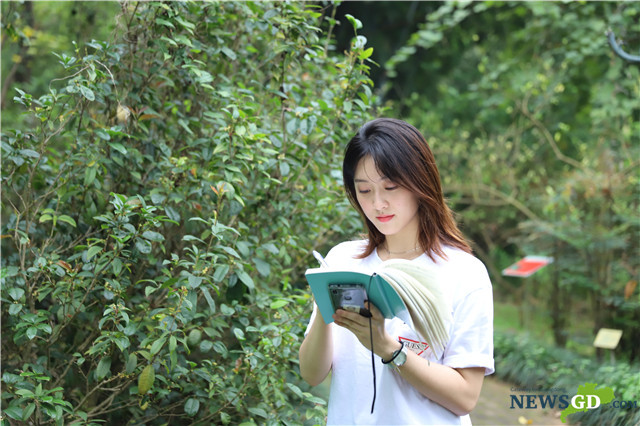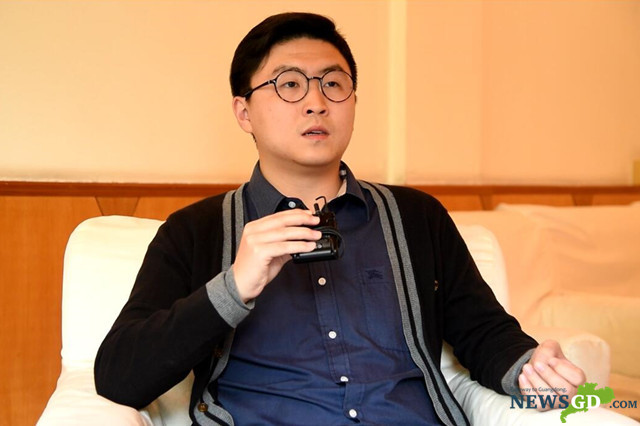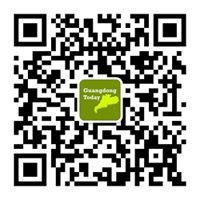"Mint is one of the main ingredients of Singapore Axe Oil,” says Tanny Kong, a fourth-year student of Chinese medicine from Singapore walking through the Botanical Garden of Guangzhou University of Chinese Medicine, has been a master of all kinds of herbs.
Ms Kong said she hopes to be able to learn Chinese medicine in Guangdong and master the knowledge and skills required to return to Singapore to open a Chinese medicine clinic and promote TCM culture around the world.
Over the last few years, other young Singaporeans, like Kong, have chosen to study in Guangdong Province with the dream of a career in Chinese medicine. As a result TCM has built a bridge, allowing more cooperation and exchange between Guangdong and Singapore, and has pushed Chinese medicine culture into a wider international arena.
Tanny Kong observes herbs at the Botanical Garden of Guangzhou University of Chinese Medicine. [Photo: Steven Yuen]
Young Singaporeans Studying Chinese Medicine in Guangdong
After four years studying in China, Tanny Kong, 22, is now a health consultant for her family and friends. She herself administers acupuncture to her father to help relieve the pain of his arthritic shoulder. Her friends often ask her for advice on how to keep healthy.
In Tanny Kong's opinion, Chinese medicine has an almost magical charm. Born into a family with a background in Chinese medicine, Tanny Kong admired the traditional Chinese medicine diagnosis method of "seeing and hearing" from an early age. When it came to choosing a major in college, she had already made up her mind to study Chinese medicine, and studying in Guangdong, where TCM has a long history, seemed clearly to be the best choice.
Having come to Guangdong, Tanny Kong expresses that something else she has benefited from is gaining an understanding of the characteristics of Lingnan culture, including a diet based approach and herbal tea.
After graduating from a five-year undergraduate program, Kong plans to continue to study postgraduate studies at the Guangzhou University of Chinese Medicine. She will return to Singapore to open a Chinese Medicine clinic to help more needy people through her professional knowledge of TCM and Guangdong’s dietetic culture.
William Yuen is in an interview with Newsgd.com. [Photo: Steven Yuen]
William Yuen, another Singaporean who majored in TCM at Guangzhou University of Chinese Medicine seven years ago, has now entered the second year of his Acupuncture and Massage Postgraduate Studies. William Yuen has obtained licenses to practice medicine in both China and Malaysia respectively, and he plans to pursue a career in TCM education in Singapore in the future.
While Singapore also attaches great importance to Lingnan's acupuncture culture, Yuen said, little is known about the high efficacy of acupuncture, however.
Guangdong and Singapore have similar climates, and so Yuen believes Lingnan acupuncture will be suitable for most Singaporeans. At present, Yuen’s mentor is considering setting up a Lingnan Acupuncture Workstation in Singapore to spread awareness of the treatment.
In addition, in the era of mobile interconnection, William Yuen also wants to expand into this arena back in Singapore, noting that Guangdong is at the forefront in this regard. Patients seeking treatment for TCM, most of the time since then can be quickly screened through doctors using smartphone apps with doctors prescribing prescriptions, and the medicine simultaneously being prepared and finally sent directly to the patient's home. The whole process is very convenient. Yuen hopes to bring the idea to Singapore in the future so that more people can experience the benefits of Chinese medicine in a streamlined way.
Tanny Kong (L) and her friend are jogging in the University Town Campus of Guangzhou University of Chinese Medicine. [Photo: Steven Yuen]
Platform for Cooperation
In recent years, Guangdong and Singapore have worked closely on training, academic exchange and scientific research. Since 2006, the Singapore College of Traditional Chinese Medicine and the Guangzhou University of Chinese Medicine have jointly offered a seven-year bachelor's degree programme in Chinese medicine. From 2016, a five-year full-time bachelor's degree course, a master's degree course and a doctoral degree course in Chinese medicine were jointly offered. For the Guangzhou University of Chinese Medicine, the average number of international students from Singapore is between 50 and 70 a year.
You Jiang, dean of International College of Guangzhou University of Chinese Medicine, noted that after completing their studies at the university, most Singaporean students either return to Singapore or head to the United States to practice medicine. They first obtain a local medical license, however, and some former students are currently engaged in education, trade, health care and other related industries.
Reported by Simon Haywood, Monica Liu
Edited by Wing Zhang
Video by Li Jiangrui
中医药文化搭起广东与新加坡交流新桥梁
“这是薄荷,新加坡斧标驱风油的主要原料之一。”走在广州中医药大学的药物植物园区药王山,来自于新加坡的中医学专业四年级学生江绮茵对各种草药已是如数家珍。
江绮茵说她希望可以通过在广东的学习,掌握中医药知识技能,将来回到新加坡开中医馆,把中医药文化推向世界。
近年来,像江绮茵一样怀揣中医职业梦想,选择来到广东学习的新加坡年轻人,正在不断增加,通过中医药文化搭起了广东和新加坡合作交流的桥梁,也把博大精深的中医药文化推向了更广的国际舞台。
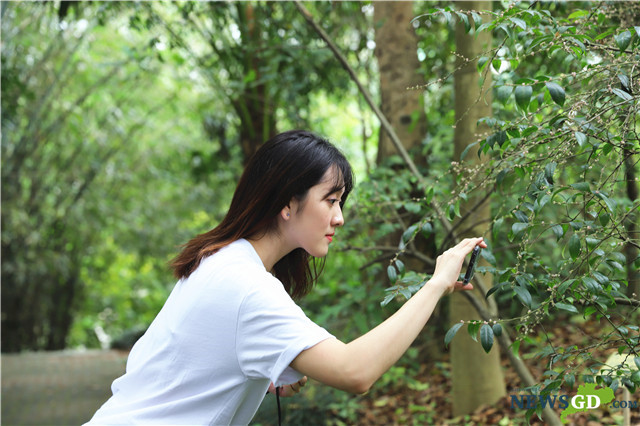
江绮茵在广州中医药大学的药物植物园区药王山拍摄草药。【图/袁子翔】
在广东学习中医的新加坡年轻人
在中国经过四年系统的中医学习,22岁的江绮茵如今俨然已是身边亲朋好友的养生顾问,父亲有肩周炎,她亲自为父亲针灸以缓解疼痛感;朋友咨询她如何在不喝中药的情况下养身保健,她建议他们坚持练习八段锦。
在江绮茵看来,中医药有着神奇的魅力。出生于中医世家,江绮茵自幼便钦佩中医“望闻问切”诊断方法的神奇,大学选择专业时,她很快下定决心要学习中医,而到中医药文化源远流长的广东留学,显然是最好的选择。
来到广东,除了专业课程,江绮茵认为自己另一大收获是了解到岭南文化的特色。岭南的食疗文化、广东的凉茶理念等都让江绮茵获益良多。
江绮茵计划五年制的本科毕业后,继续在广州中医药大学攻读研究生,将来回到新加坡开设一家中医馆,用自己的专业中医知识和引入广东的食疗文化等帮助更多有需要的人。
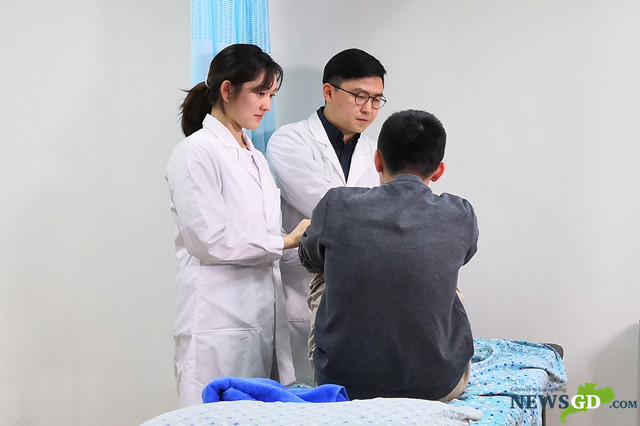
江绮茵(左)和师兄袁梓朗在广州中医药大学第一附属医院学习针灸。【图/刘灵芝】
而在七年前就已经在广州中医药大学就读中医学专业的袁梓朗,现在已经进入针灸推拿专业研究生二年级的学习。目前,袁梓朗已在中国和马来西亚分别考取了行医执照,未来,他计划在新加坡从事中医教育工作。
袁梓朗说,新加坡也相当重视岭南针灸文化,但对高疗效的针灸方法认识得还不多,比如针对中风、疑难杂症的针法等,广东和新加坡的气候相似,两地人的体质也相似,相信岭南针灸会适合大多数新加坡人。目前,袁梓朗的导师正考虑在新加坡设立岭南针灸工作站,把岭南针灸传播到新加坡,让更多本地人受益。
此外,在移动互联时代,袁梓朗也想在新加坡拓展中医与互联网科技的深度结合。
他提到,广东在互联网与中医结合方面走在前列,病人求治中医,除了首次问诊需要“望闻问切”了解病况外,此后大都可以用手机软件快速问医,医生同步开出药方,接下来,药厂便可按照药方将中药打磨成粉或是代煎,再直接送到病人家中,病人足不出户就可以拿到中药,整个流程非常方便,解决了很多人嫌麻烦不看中医的顾虑。袁梓朗希望未来将这一理念带到新加坡,让更多人用便捷方式体验到中医的益处。

江绮茵(右)和朋友在广州中医药大学大学城校区的舞蹈室练习跳舞。【图/袁子翔】
中医药搭起合作桥梁
中医药文化在新加坡有着深远的影响,新加坡民众对中医药运用也有了一定接受度,因此,中医药为广东与新加坡新时代合作搭建起了桥梁。
近年来,广东与新加坡在中医人才培养、学术交流、科学研究等方面进行了深入合作,2006年起,新加坡中医学院与广州中医药大学合办七年制中医学士学位课程;2016年联合开办五年全日制中医学士学位课程、硕士学位课程和博士学位课程。
广州中医药大学国际学院院长游江表示,选择中医药专业进行深造的留学生以新加坡、马来西亚、泰国和越南等东南亚国家学生的比例更高,以广州中医药大学来说,来自新加坡的留学生平均每年有50至70人左右。
游江指出,在完成广州中医药大学的学业后,新加坡学生大多会返回新加坡或赴美国,以行医为主,但前提是先获取当地的行医执照,此外,也有部分学生毕业后从事中医教育、医药贸易、健康养生等相关行业。
【记者】 张莹 刘灵芝 曾莉娟(新加坡《联合早报》)
【视频】 李江锐




